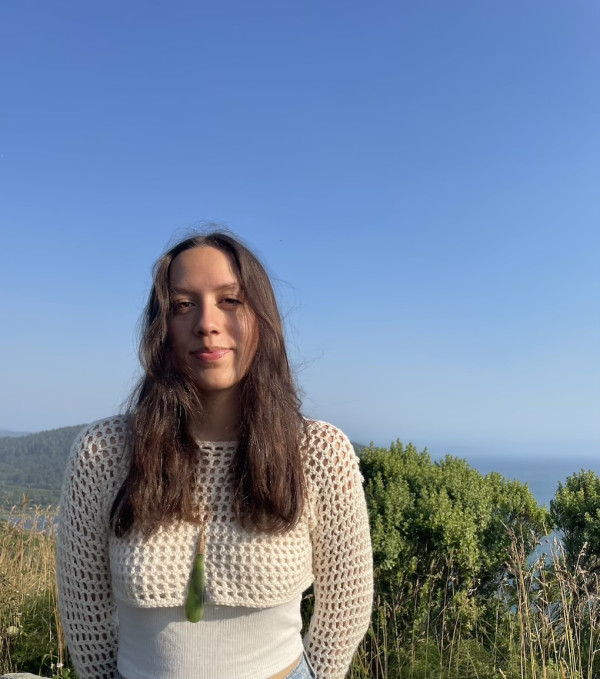Te Maia Wiki is 18 years old and originates from Ngāti Porou and Te Aupōuri.
She is also Native American, Yurok, which is the largest Indigenous tribe in California.
Te Maia. Photo/supplied.
She spent a few years growing up in Wellington before moving over to America with her whānau.
Te Maia and her whānau return home to Aotearoa often, and she says she feels very connected to both countries.
“Colonialism has impacted both of my communities in very similar ways, and I think there's a strength in recognising that and having solidarity among Indigenous people across the globe.”
She is currently studying at Yale University and is eligible to vote in the upcoming US election for the first time.
Te Maia has grown up in a family which she describes as very politically engaged.
“This is my first election, and I'm very excited to vote. I felt like there was so much riding on the last presidential election, and it was extremely polarised, and I saw the divide in my community and my life in many different aspects, and it was very jarring.”
She says although it's still very polarising, a lot has changed in the last year.
“It seems like we're in this two-party system that is not resonating with most Americans, I feel, and yet, I think since Kamala Harris has been nominated as the Democratic nominee, it has become a little bit more hopeful than I expected.”
US politics VS NZ politics
Te Maia says the New Zealand MMP system and the American two-party system are so different.
She feels the right-winged party in Aotearoa would be considered more of a centric party in America.
She also says the policies from the right-winged parties in Aotearoa would be considered more left-leaning in America.
Te Maia says as an Indigenous youth, it’s scary to see very conservative voices being uplifted and dominating both government systems.
“It feels like there have been decades of hard work when it comes to our rights, our health, our well-being, our culture and language revitalisation that is endangered in both countries.”
Te Maia says her major concern in terms of US politics right now is Project 2025.
She says it feels very “threatening and dangerous”.
“I feel as though it undermines our reproductive rights. I think it undermines healthcare for Indigenous Peoples. I think it's extremely damaging to the relationship between the federal government and federally recognised tribes”
“Project 2025 is a plan that undermines the rights of non-able-bodied community members and our rural communities. The Yurok tribe is in a very rural place and we’ve undergone a lot of environmental racism that has affected our rights to fish, to our waters and our whenua.”
When it comes to her vote she says there are a lot of policies that make her excited.

Te Maia. Photo/supplied.
Te Maia says the person she will be voting for has incentives she cares about like health equities, gun control, accessibility to education, providing free meals to school children and the rights of youth.
She says the US is so big that it's hard to tell who the country is leaning towards.
But from what she sees at Yale, people are leaning more towards Harris, she says.
In future elections, Te Maia is hoping for more environmental protection policies.
“Although the Biden Administration is more left-leaning, they did approve the Willow Project, which is decimating acres and acres of Indigenous Alaskan land.
“We need bolder policy when it comes to protecting our reproductive rights on a federal level and not allow those decisions to fall into the hands of states and biased individuals.”
“We need affordability, the housing crisis is huge.”
More Stories:
Gun reform: Hear two sides of the argument
Concerns the ban on semi-automatic weapons will be lifted when the Government rewrites the Arms Act.
Racism impacts health, wellbeing and identity of rangatahi Māori
It shouldn't fall on young Māori to fight structural racism, researcher says.
How the art of whakairo helps these student carvers: In photos
“ I got into whakairo because this is the only place I feel safe.”